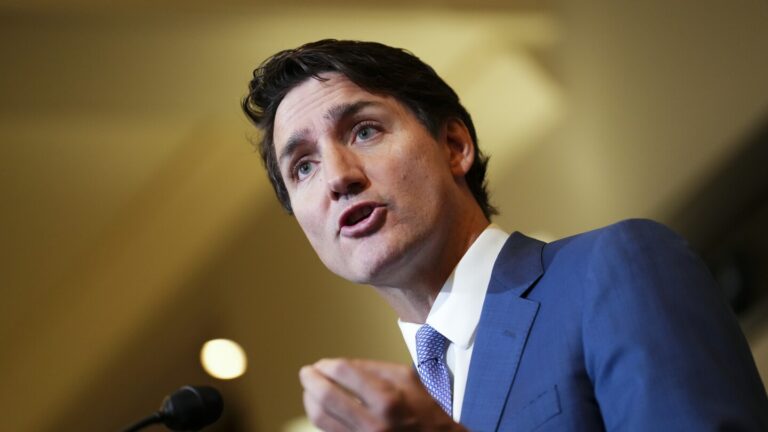TORONTO (AP) – Prime Minister Justin Trudeau acknowledged Thursday that the Canadian government failed to get the balance right from the pandemic and said he will significantly reduce the number of new immigrants coming to Canada.
Prime Minister Justin Trudeau’s Liberal government has been criticized for its plan to allow 500,000 new permanent residents into the country in each of the next two years. He said Thursday that the goal for next year is to add 395,000 new permanent residents, with that number dropping to 380,000 in 2026 and 365,000 in 2027.
“During these turbulent times emerging from the pandemic, there was an imbalance between meeting workforce demands and sustaining population growth,” Trudeau said.
“Immigration is essential to Canada’s future, but it must be managed and sustainable.”
Prime Minister Trudeau faces calls from within his own party not to seek a fourth term, but he is enduring mounting criticism over his immigration policies and the negative impact population growth is having on housing prices.
He said the Canadian government will reduce the number of immigrants Canada accepts over the next three years, which will freeze population growth for the next two years. Canada’s population reached 41 million in April. The population in 2019 was 37.5 million.
“Even Justin Trudeau wants to close Canada’s border,” Donald Trump wrote on social media Thursday while advocating for stronger U.S. border measures.
Prime Minister Trudeau said Canada needs to stabilize population growth so that governments at all levels can make necessary changes to health care, housing and social services to accommodate more people in the future.
Immigration Minister Mark Miller said reducing the number of immigrants would help ease the country’s housing shortage.
He also acknowledged changing public opinion on immigration.
“The amount we have proposed is concerning,” Miller said.
Miller said the government recognizes the pressures Canadians are facing and needs to adapt its policies accordingly. He said government leaders are listening and will continue to protect the integrity of our immigration system and responsibly grow Canada’s population.
“We are an open country, but not everyone can come to this country,” he said, adding that Canada will continue to welcome foreigners and that the government’s immigration goals remain ambitious. He pointed out that.
Prime Minister Trudeau has long touted Canada’s immigration policies and how the country is better than its peers at accepting newcomers and integrating them into the economy.
Opposition Conservative Party Leader Pierre Poièvre accused Trudeau of destroying the national consensus on immigration.
“Through his own personal incompetence, he destroyed our immigration system and destroyed 150 years of common sense agreement between Liberals and Conservatives on this issue,” Poièvre said.
“He’s too busy fighting his own caucus to fix what he broke on immigration and housing and other things,” he added.
Poièvre was referring to calls from some members of Trudeau’s own party to not run for a fourth term. The calls represent one of the biggest tests of Trudeau’s political career, but he said Thursday he plans to stay in office until the next election.
Nelson Wiseman, professor emeritus of political science at the University of Toronto, said the Trudeau government has made a terrible mistake on immigration.
“The government’s rationale was sound: attracting more young immigrants to grow the economy and sustain Canada’s aging population. But Ottawa has made sure that its residents, nationals and immigrants alike, have access to housing, health care. , education, and other welfare needs,” Wiseman said.
“All of this was the responsibility of the state government, and there was very little cooperation or coordination between the two levels of government,” he said.
Wiseman said a certain percentage of Canadians have always been xenophobic, but it’s much smaller than in some other countries.
“Many Canadians oppose the recent influx of immigrants, temporary workers and students, citing increased housing, health, education and other welfare issues.Ottawa is reading the poll. We are responding accordingly,” he said.


